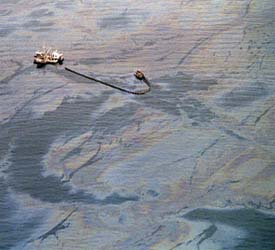10,000 barrels oil collected in Gulf of Mexico in the past 24 hours
 The collection of oil spilling into the Gulf of Mexico had increased to 10,000 barrels in the past 24 hours, U. S. Coast Guard Adm. Thad Allen said on Sunday.
The collection of oil spilling into the Gulf of Mexico had increased to 10,000 barrels in the past 24 hours, U. S. Coast Guard Adm. Thad Allen said on Sunday.
Amount was up from 6,000 barrels the day before, said Allen, the national incident commander who appeared on ABC's "This Week" and other network news programs. The destroyed Deepwater Horizon oil rig has been pouring an estimated 19,000 barrels a day into the gulf since April 20.
Allen said on "This Week", "We're not going to know how much oil is coming out until we're able to optimize the production, and that's what they're doing right now."
The ultimate solution will be two relief wells being drilled nearby that won't be completed until August, BP and others have said.
The containment effort hasn't included the use of tankers to vacuum up the oil as the Saudis did during a 1993 spill because of "a couple of issues," the admiral said.
He further said, "No. 1, the tankers actually have to be modified. They're not ready to go right now. No. 2, we don't know what those modifications will do to the stability of the vessels and how they operate. No. 3, the area of operation is very, very different. We've got anywhere from 20 to 30 vessels within a one square mile over the top of that well at any particular time, managing remotely operated vehicles, doing the drilling the relief wells and so forth, so it's not, I'm not sure it's the right application for that technology."
Allen, during a briefing with reporters on Sunday, said that wind has driven the northern edge of the spill perimeter "closer to Mississippi-Alabama."
He also said, "In Florida we're actually starting to see product come ashore in the form of tar balls and small oil patties. And the impact is from western Mississippi over towards Pensacola."
Oil is expected to begin moving north and slightly east, said Allen.
"The area we're concerned about is basically from the Mississippi-Louisiana line clear over to Port St. Joe in Florida." (With Inputs from Agencies)